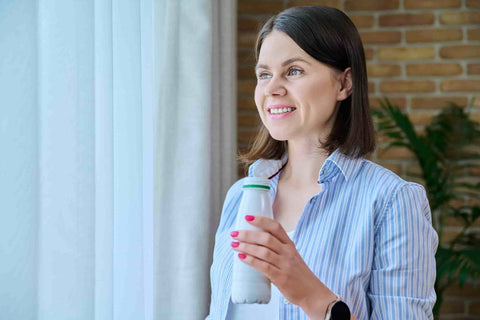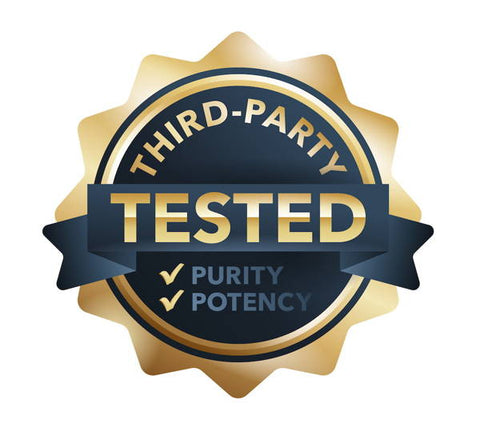
How to Choose the Right Probiotic Supplement for Your Needs

Written By:
Katie Stone - Naturopath
Medical Reviewer:
Dr. Nare Simonyan - PhD Pharmaceutical Science
Edited By:
Kari Asadorian - Bachelor of Science in NursingUpdated On:
May 27, 2025Table of Contents
Understanding probiotics
Probiotics are live microorganisms otherwise known as beneficial bacteria. They are naturally present in many fermented foods such as yogurt, sauerkraut, and kimchi, and also widely available as dietary supplements.
What does a probiotic do?
The human gut is home to hundreds of different bacteria species which all play powerful roles in breaking down food and providing nutrients to the body, among many other things.
The species that have been shown to exhibit potential health benefits by modulating intestinal microbiota are commonly selected for probiotic supplements.
Taking probiotic supplements and/or eating probiotic-rich food can help to boost the quality and quantity of beneficial bacteria in your own gut. And, as gut bacteria play a central role in almost every bodily system, this can have numerous benefits for overall wellbeing.
What are probiotics good for?
When choosing the best probiotic supplement for you, it helps to know that different species of probiotics have different benefits.
So, if you’ve ever wondered, “Should I take probiotics?”, you need to think about the particular benefits you want. Are you looking to improve your digestive health? Boost your immune system? Treat a skin condition? Support weight management?
Some of the many health benefits of probiotics include supporting the immune system, reducing the risk of bowel diseases, improving the immune system, restoring microbial balance, treating lactose intolerance, reducing cholesterol and high blood pressure, balancing hormones, managing skin conditions, reducing traveler’s diarrhea, and much more.1
Things to look for when shopping for a probiotic supplement:
Colony-forming unit (CFU) and dose
A probiotic supplement should be labeled with the number of colony-forming units (CFU) it contains. This indicates the number of viable cells in the product - that is, the total number of live bacteria.
Most supplements claim to have anything from a few billion CFU to 10 billion. Some high-end products may contain up to 50 billion CFU or more.
The CFU is important because probiotics must be “alive” when they are consumed in order to properly colonize the gut and provide their health benefits. Probiotic bacteria can die while on the shelf, so the higher the CFU count, the better. In addition, the CFU count at the date of manufacture may not be the same as when you purchase the product. Look for a ‘guaranteed CFU’: this will mean that the probiotic bacteria are alive until the end of the shelf life, not just at the date of manufacture.
Spore-based probiotics are different. They don’t require a high CFU as they remain dormant until they are consumed. Unlike non-spore based probiotic products, Bacillus spores survive both shelf-life and the passage through the gastrointestinal tract. They transform into their active form upon reaching the large intestine, where they begin colonizing the gut.2
According to researchers, the viable cell numbers in a probiotic supplement should be at least 10⁶ CFU (one million) before the expiry date in order to meet the claimed health benefits. They also recommend that the minimum dose per day is 10⁸ (one hundred million) to 10⁹ (one billion) cells.3
Many factors such as pH, acidity, oxygen exposure, redox potential, flavoring agents, packaging materials, and packaging conditions are associated with viable cell count of a microorganism in a product throughout the manufacturing and shelf-life periods. The CFU must account for all these factors.
Quality over quantity
Third-party testing is one of the most important markers of quality in any supplement.
Probiotics that have been third-party tested have undergone rigorous testing by an independent laboratory. This ensures that they contain both the number of bacteria and the specified strains stated on the label.
Third-party testing also certifies that the product meets industry standards, is safe for consumption, and free from contaminants such as pesticides, heavy metals, and unwanted bacteria.
Here at Methyl-Life®, we pride ourselves on stringent quality control processes. We’ve implemented every possible measure to maximize the safety, efficacy, and reliability of our products.
We are fully FDA-registered and audited. We use NSF-certified manufacturers, and we follow cGMP best practices.
Most importantly, every ingredient we use in our products - including our probiotics - undergoes third-party testing to confirm that it matches every detail on the Certificate of Analysis (CofA). If any ingredient doesn't meet the standard CofA, we don't use it.
Probiotic foods vs. supplements
Both foods and supplements can be used as delivery vehicles for probiotics. However, they each have their own advantages and disadvantages.
The efficacy of probiotic bacteria is mainly based on their viability (being live in food products and supplements) and their survivability through both manufacturing and then the harsh environment of the gut. From there, the activity of the probiotics is also crucial.
The viability and survivability of a probiotic food or supplement depend largely on the particular strain and what it is exposed to. These factors can be affected by pH, other nutrients, and heat treatment.
Supplement manufacturers can maximize the efficacy of their probiotic products through techniques such as micro-encapsulation or combining different synergistic strains, prebiotics, and/or nutrients.
Probiotic drinks and foods have buffering properties that can help to protect probiotics during their passage through the gut. Foods also contain the essential nutrients needed to help maintain the activity and efficacy of the probiotic bacteria, supporting their growth.4
However, some researchers have noted that probiotics must be consumed at a level of 10 million CFU to successfully colonize the gut. One study that tested probiotic yogurt found that cold storage could hinder the survival of the probiotic strains, causing them to fall below this critical concentration.5
Probiotic supplements are available in a variety of forms, including pills, capsules, tablets, caplets, gelcaps, liquids and powders.
While there are no specific studies comparing the efficacy of foods vs supplements as probiotic delivery vehicles, supplements do have some advantages over foods. They offer a convenient means of taking a high dose of beneficial bacteria every day. This can be particularly beneficial in the case of acute diarrhea or other illnesses, in which a substantial amount of probiotics are needed right away.
A great probiotic supplement for gut health and improving microbiome population is Mega SporeBiotic from Methyl-Life®. This unique, broad-spectrum probiotic contains spores that remain dormant until they reach the gut, where they become active and begin colonizing. The Bacillus spores are also shown to help reduce inflammation and boost short-chain fatty acid (SCFA) production by reconditioning the gut microbiota.6
Probiotic foods, on the other hand, are rarely able to guarantee the quantity or viability of live bacteria per serving. Foods are also less likely to provide the same high quantities of beneficial bacteria as in supplements. People may be less likely to consume a certain food every day than they are to take a probiotic supplement.
What foods have probiotics?
Yogurt, kefir, kimchi, sauerkraut, miso, tempeh, pickles, and many other fermented foods are great sources of probiotics.
What are the side effects of probiotics?
Probiotics can cause some minor side effects at first, such as bloating, gas, diarrhea, constipation, or a sore tummy. This is usually just a sign that they are ‘live’ and settling into the gut, crowding out the ‘bad bacteria’. This can result in the Jarisch-Herxheimer die-off reaction.7 Most symptoms will disappear within a few days to a week or so.
What about prebiotics?
Dietary prebiotics are a type of plant fiber that supports the composition and activity of the gut microbiota, which in turn can provide a range of health benefits. 8 Prebiotics are fermented by intestinal microbiota, which ‘fuels’ their growth and activity. In other words, prebiotics help to promote the reproduction and metabolism of intestinal probiotics, optimizing their effects in the body.9
If you’re looking for a supplement that contains both prebiotics and probiotics, Methyl-Life’s® Gut Health 4-in-1 is ideal. This comprehensive probiotic provides full-spectrum microbiome support, including patented pre-, pro-, and postbiotics as well as digestive enzymes. The prebiotics and probiotics support and nourish gut microbiome while postbiotics support a normal inflammatory response and healthy cell renewal. Postbiotics are the beneficial substances left behind after prebiotics and probiotics have been metabolised. These substances can include vitamins B12, folate, vitamin K, amino acids, antimicrobial peptides, and short-chain fatty acids. 10
What is the best probiotic for women?
Women who experience UTIs (Urinary tract infections), yeast infections, or other bacterial imbalances are advised to take probiotics regularly. A good option for women is RestorFlora™. This is another spore-based probiotic that offers maximum resilience to the harsh conditions of the gut. It also contains Saccharomyces boulardii, a beneficial probiotic yeast that can withstand antibiotics. S. boulardii can also inhibit the growth of Candida albicans, a type of fungi associated with fungal overgrowth in women.11
What is the best probiotic to take if you're taking antibiotics?
Saccharomyces boulardii is also naturally resistant to antibiotics, which means it is an excellent probiotic supplement to take alongside antibiotic treatment. It is also shown to reduce antibiotic-associated diarrhea.12
What to avoid when choosing probiotics
Avoid probiotics that contain fewer than 5 billion CFU. Most clinical trials have shown successful results with supplements containing a minimum of 10 billion CFU and up to 100 billion.
Also avoid products that contain additives such as binders, fillers, coloring agents, flavorings, preservatives, tableting aids, or other substances.
It’s important to look for probiotics that contain the most researched and beneficial strains, such as those from the Lactobacillus and Bifidobacterium families.
If you have health issues or any other concerns, be sure to first check with your doctor to see if probiotics are right for you.
The takeaway
A quality probiotic supplement can provide many benefits for the body. Probiotics and prebiotics work together to support beneficial bacteria in the gut, which in turn supports almost every other bodily system. Probiotic supplement benefits often far outweigh probiotic foods, but it’s still helpful to eat foods rich in beneficial bacteria.
When choosing a probiotic, be sure to check the CFU count and the variety of strains in the product. Always look for the manufacturer’s quality assurance processes and certifications to ascertain the purity and efficacy of the product.



Product Recommendations
Mega SporeBiotic™- Improve Gut Health with Innovative Spore-Based Probiotic
$63.99
- Aids in Digestion & Improves Regularity
- Produces Nutrients: Bs, K2, Nattokinase & CoQ10
- Helps Control Bacterial Overgrowth
- Detoxifies the Intestinal Tract
References
-
Lye Huey Shi, Kunasundari Balakrishnan, Kokila Thiagarajah, Nor Ismaliza Mohd Ismail, Ooi Shao Yin; "Beneficial Properties of Probiotics"; Tropical life sciences research; 2016 Aug
https://www.ncbi.nlm.nih.gov/pmc/articles/PMC5031164/
-
Adrian Catinean, Anamaria Sida, Celina Silvestru, Gheorghe G. Balan; "Ongoing Treatment with a Spore-Based Probiotic Containing Five Strains of Bacillus Improves Outcomes of Mild COVID-19"; Nutrients; 2022 Dec
https://www.mdpi.com/2072-6643/15/3/488
-
Lye Huey Shi, Kunasundari Balakrishnan, Kokila Thiagarajah, Nor Ismaliza Mohd Ismail, Ooi Shao Yin; "Beneficial Properties of Probiotics"; Tropical life sciences research; 2016 Aug
https://www.ncbi.nlm.nih.gov/pmc/articles/PMC5031164/
-
Antonia Terpou, Aikaterini Papadaki, Iliada K Lappa, Vasiliki Kachrimanidou, Loulouda A Bosnea, Nikolaos Kopsahelis; "Probiotics in Food Systems: Significance and Emerging Strategies Towards Improved Viability and Delivery of Enhanced Beneficial Value"; Nutrients; 2019 Jul
https://www.ncbi.nlm.nih.gov/pmc/articles/PMC6683253/
-
Valerie Rosburg, Terri Boylston, Pamela White; "Viability of bifidobacteria strains in yogurt with added oat beta-glucan and corn starch during cold storage"; Journal of food science; 2010 Jun
https://pubmed.ncbi.nlm.nih.gov/20629865/
-
Adrian Catinean, Anamaria Sida, Celina Silvestru, Gheorghe G. Balan; "Ongoing Treatment with a Spore-Based Probiotic Containing Five Strains of Bacillus Improves Outcomes of Mild COVID-19"; Nutrients; 2022 Dec
https://www.mdpi.com/2072-6643/15/3/488
-
Manman Niu, Qinrui Li, Jishui Zhang, Fang Wen, Weili Dang, Guiqin Duan, Haifeng Li, Wencong Ruan, Pingri Yang, Chunrong Guan, Huiling Tian, Xiaoqing Gao, Shaobin Zhang, Fangfang Yuan, Ying Han; "Characterization of Intestinal Microbiota and Probiotics Treatment in Children With Autism Spectrum Disorders in China"; Frontiers in neurology; 2019 Nov
https://www.ncbi.nlm.nih.gov/pmc/articles/PMC6848227/
-
Dorna Davani-Davari, Manica Negahdaripour, Iman Karimzadeh, Mostafa Seifan, Milad Mohkam, Seyed Jalil Masoumi, Aydin Berenjian, Younes Ghasemi; "Prebiotics: Definition, Types, Sources, Mechanisms, and Clinical Applications"; Foods; 2019 Mar
https://www.ncbi.nlm.nih.gov/pmc/articles/PMC6463098
-
Siyong You, Yuchen Ma, Bowen Yan, Wenhui Pei, Qiming Wu, Chao Ding, Caoxing Huang; "The promotion mechanism of prebiotics for probiotics: A review"; Frontiers in nutrition; 2022 Oct
https://www.ncbi.nlm.nih.gov/pmc/articles/PMC9581195/
-
Priyamvada Thorakkattu, Anandu Chandra Khanashyam, Kartik Shah, Karthik Sajith Babu, Anjaly Shanker Mundanat, Aiswariya Deliephan, Gitanjali S Deokar, Chalat Santivarangkna, Nilesh Prakash Nirmal; "Postbiotics: Current Trends in Food and Pharmaceutical Industry"; Foods; 2022 Oct
https://www.ncbi.nlm.nih.gov/pmc/articles/PMC9564201/
-
Hua Ling, Ruirui Liu, Qi Hui Sam, Haosheng Shen, Louis Yi Ann Chai, Matthew Wook Chang; "Engineering of a probiotic yeast for the production and secretion of medium-chain fatty acids antagonistic to an opportunistic pathogen Candida albicans"; Frontiers in bioengineering and biotechnology; 2023 Feb
https://www.ncbi.nlm.nih.gov/pmc/articles/PMC10008859
-
Theodoros Kelesidis, Charalabos Pothoulakis; "Efficacy and safety of the probiotic Saccharomyces boulardii for the prevention and therapy of gastrointestinal disorders"; Therapeutic advances in gastroenterology; 2015 Mar
https://www.ncbi.nlm.nih.gov/pmc/articles/PMC3296087/

About the Author
Katie is a qualified Naturopath (BNatMed) and freelance writer from New Zealand. She specializes in all things health and wellness, particularly dietary supplements and nutrition. Katie is also a dedicated runner and has completed more half-marathons than she can count!
Related Articles

What is the Best Form of B12 for You?
Written By: Jamie Hope - Founder of Methyl-Life

Like what you read?
Please subscribe to get more content like this sent to your inbox.
Share This Article
Browse Categories
Product Recommendations
Mega SporeBiotic™- Improve Gut Health with Innovative Spore-Based Probiotic
$63.99
STUDIES SHOW THAT Mega SporeBiotic™




